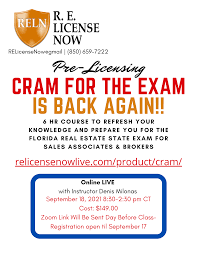
You will need to know what education is required before you can apply for a Florida real-estate license. This article will explain how much education is necessary before you can get a license. It will also discuss the time commitment and how to get the best out of your education. We will also discuss which courses should be taken and what the cost of each course is.
Pre-licensing education
Pre-licensing education must be completed before you are allowed to start real estate practice in Florida. Before you can apply for a licence, you need to have completed at minimum 63 hours of prelicensing instruction. The courses should cover the law, principles, real estate practice, and mathematics. Some courses may cost as little as $100 or more. The minimum passing score required to be licensed in Florida is 70 percent. Attorneys do not need to take any pre-licensing courses because they are allowed to sit for the sales associate exam without a pre-license.

There are many options for pre-licensing in Florida. You can either take the course online or visit a company in person. Many of these courses offer self-paced learning and practice exams. Others provide study aids in the form of textbooks or practice exams. No matter which program you choose, you must complete your state's prelicensing education requirements. There are several online programs that offer prelicensing education, and some of them are free.
Cost of pre-licensing education
The cost of pre-licensing education in real estate depends on where you live. It can run from $100 to $1,000 depending on your state. There are many factors that can explain this. The most common reason is the time and effort required to create real estate courses. Companies that produce these courses must pay their staff to keep the content updated and to keep pace with state legal requirements. These courses are not usually free and can be offered by title companies or brokerages. They are also longer and more complex than other courses.
Regardless of the state you live in, the cost of pre-licensing education to obtain a real estate license in Florida is worth every penny. The Florida realty exam is composed of 100 multiple-choice and 75% passing questions. There are 45 questions that examine real estate law principles and 10 questions which test your mathematical knowledge. You can expect to score 75% or more if you study well.
Pre-licensing education takes time
An individual must be at least eighteen years of age and have passed a background check to get a Florida real estate license. They also need to complete at least 90 hours in pre-licensing education, and a six-hour course on contract writing. They must also be of good moral character. If they were convicted of a felony, they will not be considered for a real estate license. You must have your fingerprints cleared. After that, they will need to be approved online by their Broker and complete their continuing education requirements.

The applicant must be at the least 18 years of age and have a United States social security number. Additionally, applicants must hold a high school diploma. A license to be a Florida real estate broker is not required. But, it's helpful to have the right foundation in order to start the process. Florida recognizes licenses from a few states, including Nebraska, Arkansas, Georgia, Illinois, and Arkansas. Florida licenses are available to applicants who have a valid real estate license. Candidates from Arkansas, Georgia and Illinois must also pass a state exam.
FAQ
How do I know if my house is worth selling?
You may have an asking price too low because your home was not priced correctly. Your asking price should be well below the market value to ensure that there is enough interest in your property. Get our free Home Value Report and learn more about the market.
How many times may I refinance my home mortgage?
It all depends on whether your mortgage broker or another lender is involved in the refinance. Refinances are usually allowed once every five years in both cases.
What are the benefits to a fixed-rate mortgage
Fixed-rate mortgages guarantee that the interest rate will remain the same for the duration of the loan. You won't need to worry about rising interest rates. Fixed-rate loans have lower monthly payments, because they are locked in for a specific term.
How do I calculate my interest rate?
Market conditions affect the rate of interest. The average interest rate during the last week was 4.39%. Divide the length of your loan by the interest rates to calculate your interest rate. Example: You finance $200,000 in 20 years, at 5% per month, and your interest rate is 0.05 x 20.1%. This equals ten bases points.
How long will it take to sell my house
It depends on many factors, such as the state of your home, how many similar homes are being sold, how much demand there is for your particular area, local housing market conditions and more. It may take up to 7 days, 90 days or more depending upon these factors.
What are the three most important factors when buying a house?
Location, price and size are the three most important aspects to consider when purchasing any type of home. The location refers to the place you would like to live. Price refers the amount that you are willing and able to pay for the property. Size refers to how much space you need.
Statistics
- 10 years ago, homeownership was nearly 70%. (fortunebuilders.com)
- Based on your credit scores and other financial details, your lender offers you a 3.5% interest rate on loan. (investopedia.com)
- Private mortgage insurance may be required for conventional loans when the borrower puts less than 20% down.4 FHA loans are mortgage loans issued by private lenders and backed by the federal government. (investopedia.com)
- This seems to be a more popular trend as the U.S. Census Bureau reports the homeownership rate was around 65% last year. (fortunebuilders.com)
- This means that all of your housing-related expenses each month do not exceed 43% of your monthly income. (fortunebuilders.com)
External Links
How To
How to Manage a Property Rental
You can rent out your home to make extra cash, but you need to be careful. We will show you how to manage a rental home, and what you should consider before you rent it.
Here are some things you should know if you're thinking of renting your house.
-
What are the first things I should consider? Before you decide if you want to rent out your house, take a look at your finances. If you are in debt, such as mortgage or credit card payments, it may be difficult to pay another person to live in your home while on vacation. Check your budget. If your monthly expenses are not covered by your rent, utilities and insurance, it is a sign that you need to reevaluate your finances. It might not be worth the effort.
-
How much will it cost to rent my house? Many factors go into calculating the amount you could charge for letting your home. These factors include the location, size and condition of your home, as well as season. You should remember that prices are subject to change depending on where they live. Therefore, you won't get the same rate for every place. Rightmove shows that the median market price for renting one-bedroom flats in London is approximately PS1,400 per months. This means that your home would be worth around PS2,800 per annum if it was rented out completely. It's not bad but if your property is only let out part-time, it could be significantly lower.
-
Is this worth it? Doing something new always comes with risks, but if it brings in extra income, why wouldn't you try it? Be sure to fully understand what you are signing before you sign anything. Renting your home won't just mean spending more time away from your family; you'll also need to keep up with maintenance costs, pay for repairs and keep the place clean. These are important issues to consider before you sign up.
-
Are there benefits? You now know the costs of renting out your house and feel confident in its value. Now, think about the benefits. Renting out your home can be used for many reasons. You could pay off your debts, save money for the future, take a vacation, or just enjoy a break from everyday life. You will likely find it more enjoyable than working every day. Renting could be a full-time career if you plan properly.
-
How do I find tenants? Once you decide that you want to rent out your property, it is important to properly market it. Make sure to list your property online via websites such as Rightmove. Once potential tenants reach out to you, schedule an interview. This will allow you to assess their suitability, and make sure they are financially sound enough to move into your house.
-
What can I do to make sure my home is protected? If you are worried about your home being empty, it is important to make sure you have adequate protection against fire, theft, and damage. You will need to insure the home through your landlord, or directly with an insurer. Your landlord will often require you to add them to your policy as an additional insured. This means that they'll pay for damages to your property while you're not there. However, this doesn't apply if you're living abroad or if your landlord isn't registered with UK insurers. You will need to register with an International Insurer in this instance.
-
Sometimes it can feel as though you don’t have the money to spend all day looking at tenants, especially if there are no other jobs. Your property should be advertised with professionalism. Post ads online and create a professional-looking site. It is also necessary to create a complete application form and give references. Some prefer to do it all themselves. Others hire agents to help with the paperwork. In either case, be prepared to answer any questions that may arise during interviews.
-
What should I do after I have found my tenant? If there is a lease, you will need to inform the tenant about any changes such as moving dates. You can negotiate details such as the deposit and length of stay. While you might get paid when the tenancy is over, utilities are still a cost that must be paid.
-
How do I collect rent? When it comes to collecting the rent, you will need to confirm that the tenant has made their payments. You will need to remind your tenant of their obligations if they don't pay. You can subtract any outstanding rent payments before sending them a final check. If you're having difficulty getting hold of your tenant you can always call police. The police won't ordinarily evict unless there's been breach of contract. If necessary, they may issue a warrant.
-
What can I do to avoid problems? It can be very lucrative to rent out your home, but it is important to protect yourself. Ensure you install smoke alarms and carbon monoxide detectors and consider installing security cameras. Make sure your neighbors have given you permission to leave your property unlocked overnight and that you have enough insurance. Finally, you should never let strangers into your house, even if they say they're moving in next door.